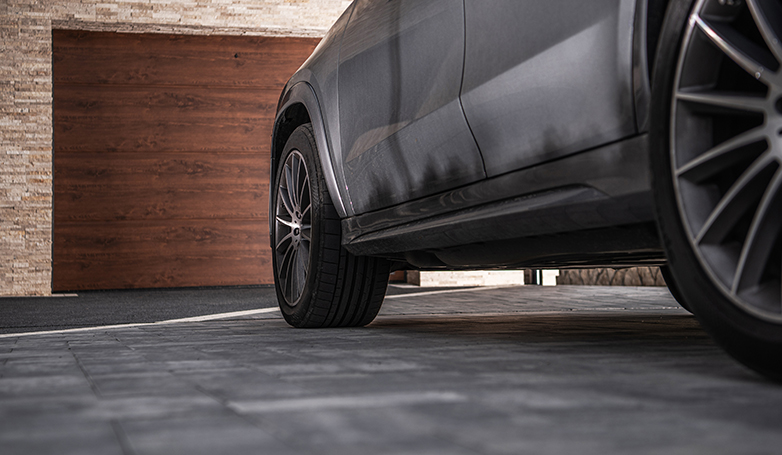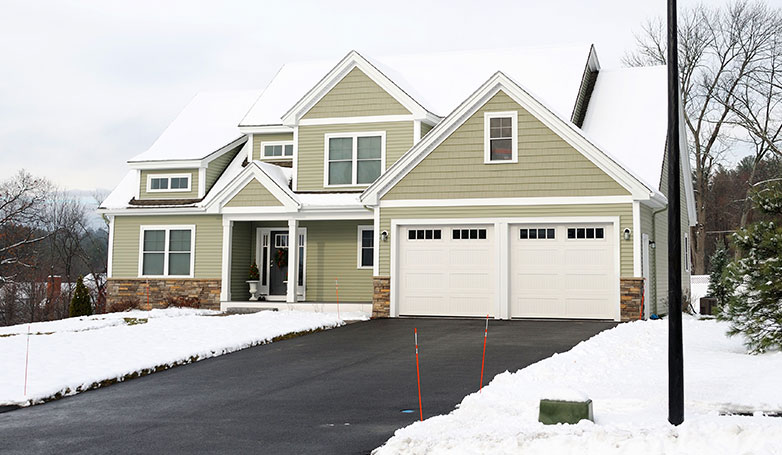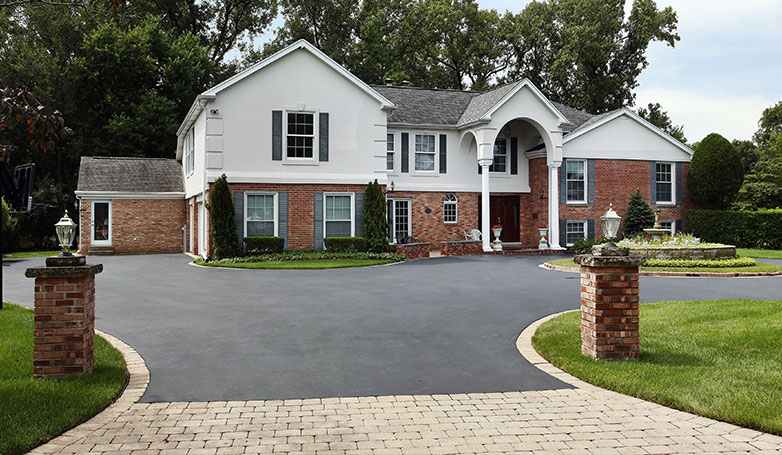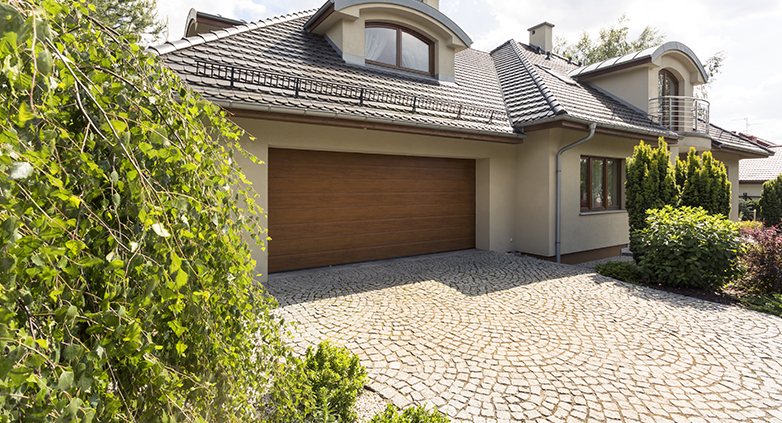Driveway Width – How Wide Should My Driveway Be?
Selecting the appropriate driveway width is vital for any property, accommodating various vehicle sizes while ensuring seamless navigation and protection of surrounding structures and landscapes.
The typical driveway width is between 10 and 12 feet, suitable for small vehicles like cars. For larger vehicles such as vans, trucks, or RVs, a minimum width of 12 feet is recommended to prevent damage to the vehicle and nearby structures. This width ensures sufficient space for parking and maneuvering without impacting nearby landscaping or building features.
Continue reading to discover additional factors that influence driveway width, including property layout, safety, and aesthetic considerations, for an optimal driveway design.
Driveway Width According to the Number of Vehicles
There are standard driveway widths for the number of cars you will park. For example, if you have more than 1 car, it is wise to know the recommended width for a driveway to accommodate all cars comfortably. Let us have a look at these measurements.
Single Car Driveway Width
A single-car driveway refers to residential driveways, and in this case, the above-mentioned standard width size of 10 feet to 12 feet will be appropriate and enough. However, you must ensure that you leave enough space on both sides of the driveway so the vehicle can turn easily without damaging any walls, fixtures, or plantations.
Plus, there should be enough space for you to step out of the car and onto the driveway’s pavement and not into your lawn. In case your driveway has walls on both sides, you have to ensure that there is enough space for both your car doors to open without hitting either wall.
Two-Car Driveway Width

The minimum recommended width for a 2-car driveway is between 20 feet and 24 feet. 20 feet will give you enough to part two cards next to each other. However, this width will not allow both car doors to open when parked side by side.
On the other hand, a 24 feet wide two-car drive provides ample space for both cars to park next to each other with their doors wide open.
Three-Car Driveway Width
As the name suggests, a three-car driveway, also known as triple driveway, allows you to park 3 cars or small to normal sized cars in a parking space. The minimum recommended measurement for this type of car driveway is between 20 feet and 30 feet.
Once again, the wider the driveway, the better it is. You have to make sure that you can open car doors easily of all 3 cars parked together on the driveway.
Circular Driveway Width
A circular driveway refers to a round-shaped drive or one that resembles a horseshoe design. If you are planning to build a circular driveway on your property, the minimum width of this driveway must be 12 feet.
This will give each vehicle enough space to turn without driving into the wall’s edge and causing damage to your driveway, property, and the vehicle itself.
Different Turning Radiuses

A turning radius is a minimum area required by the vehicle to make a turn without touching or damaging any walls, pavements, edges, plantations, lawn area, etc. there are four main turning radiuses you must consider when designing a driveway and determining its width.
Parking Areas
The minimum recommended turning radius for your parking area should be 9 feet to 18 feet for a single car. However, you will need an expert’s opinion on this if you are planning to park more than one car. On top of that, does your family or business have cars and vehicles of all shapes and sizes?
In that case, you will have to follow a thumb rule and create a turning radius for the parking area, keeping the largest vehicle or car in mind as smaller vehicles. As far as the bigger automotive can navigate, smaller ones will have no issue at all.
Backout Area
A parking space requires a minimum of 30 feet to 35 feet in length and 10 feet in width. However, a typical turnaround dimension of 10 feet by 20 feet should provide enough space for your car to back into or pull out of the drive.
Driveway Entry Radius
You must allow a minimum of 10 feet to 15 feet at the entrance of your driveway in order to avoid parking on a sidewalk. These sidewalks are the property of local and state governments. Therefore, you must not park your car in the way of people walking on these sidewalks.
Read more: Brick Driveway Edging
Garage Turning Radius
This turning radius will vary with the size of your garage, i.e., how many cars/vehicles you will be parking in it. That said, here is a minimum breakup of radii for different garage sizes.
- A single car garage- 9 to 12 feet in width
- A double car garage –20 to 24 feet in width
- Parking stalls – 10 x 20 feet
- Single car turnaround – 10 x 20 feet
Things You Must Consider When Designing a Driveway

Here are seven factors that you must think through when planning your driveway.
- Pick a style that allows you to utilize maximum parking space
- Always make sure the ease of access
- Do not forget about the driveway accessories such as LED lights and curb lights.
- Pick a design that matches your taste, i.e., contemporary or traditional
- Check with your local authorities if you need permission before installing a new driveway
- Do not forget the importance of drainage
- Take care of the trees and other plantations nearby that may get under your driveway and impact its structural integrity.
FAQs about Driveway Width
Here are some frequently asked questions about driveway width to help guide your planning.
How wide is a typical driveway?
The width of a typical driveway usually ranges between 10 to 12 feet for a single-car driveway. This width comfortably accommodates most standard-sized cars, allowing enough space for drivers and passengers to get in and out of the vehicle without constraints.
How big is an 18-car driveway?
An 18-car driveway, designed to hold 18 vehicles, is a substantial undertaking. The size would significantly depend on how the cars are arranged – single file, double file, or in a parking lot style. Typically, each car requires a width of about 8 to 10 feet and a length of 18 to 20 feet, leading to a very large area for 18 cars.
What is the ideal size of a driveway?
The ideal size of a driveway depends on the number and type of vehicles it needs to accommodate. For single-car driveways, a width of 10-12 feet is standard, while a double-car driveway typically measures between 20-24 feet wide. The length should ideally be at least 18-20 feet to comfortably fit most cars. For households with larger vehicles or multiple cars, adjustments in width and length might be necessary for convenience and safety.
Conclusion
Now that you know the basics of driveway width, you can use this information to plan the design phase of your project. However, if you wish to get some expert advice, Paving Finder can help you connect with experts’ opinions and access additional tips and resources.


